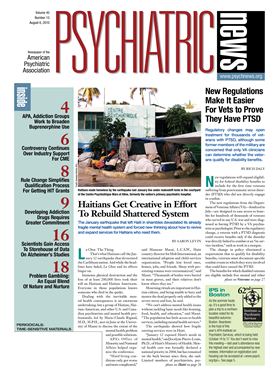A program funded by the Substance Abuse and Mental Health Services Administration (SAMHSA) is designed to expand buprenorphine treatment for opioid dependence. The program is called the Physicians' Clinical Support System for Buprenorphine (PCSS-B).
During the past six years, the PCSS-B was administered by the American Society of Addiction Medicine, but its administration will now become the responsibility of the American Academy of Addiction Psychiatry (AAAP), APA, and the American Osteopathic Academy of Addiction Medicine (AOAAM), with the hope that such collaboration will further the program's mission.
Each of the three organizations will be responsible for various aspects of the PCSS-B. For example, the AAAP and the AOAAM will offer four hours of self-study, followed by four hours of face-to-face training in how to treat opioid-dependent patients with buprenorphine in an office setting. APA will offer monthly webinars (interactive Web-based seminars) on the subject. It will also continue to offer buprenorphine courses on the Web and at the APA annual meeting and Institute on Psychiatric Services.
John Renner, M.D., an associate professor of psychiatry and director of the addiction psychiatry residency program at Boston University, is a co-principal investigator for the PCSS-B program and responsible for APA's portion of the activities. “Over the next three years we would like to see an increase in the number of psychiatrists who are comfortable treating opioid dependence and who obtain the [Drug Enforcement Administration] waiver to prescribe buprenorphine,” he told Psychiatric News.
Stephen Wyatt, D.O., an addiction psychiatrist and director of the Dual Day Treatment Program at Middlesex Hospital in Middletown, Conn., is also a co-principal investigator for the PCSS-B program, representing the AOAAM.
“There has been a huge rise in the misuse of, and dependence on, pharmaceutical opiates in this country during the past 20 years,” he noted. As a result, it is the PCSS-B's mission to inform clinicians about the problem and what they can do in their private office settings to help patients who have become dependent on opiates, he said.
Elinore McCance-Katz, M.D., Ph.D., a professor of psychiatry at the University of California, San Francisco, and an addiction specialist, is the medical director of the PCSS-B. “Our program is designed to establish a means by which we can continue to provide the federally mandated training needed for physicians to become eligible to practice office-based treatment of opioid dependence, as well as to provide ongoing mentorship to trainees as they engage in this practice,” she said. “The collaboration of AAAP, APA, and AOAAM will help us reach large numbers of physicians and clinicians, both in urban centers and rural parts of the country.”
She added that this collaboration also plans to broaden the buprenorphine training curriculum “to provide information on screening, brief intervention, referral, and treatment, as well as the use of FDA-approved pharmacotherapies for the treatment of substance use disorders that can be undertaken in outpatient settings.
“What I would like to see,” she said, “is addiction medicine [including] addiction psychiatry brought into the mainstream of medicine in the United States and hopefully, with time, in other countries as well.”
